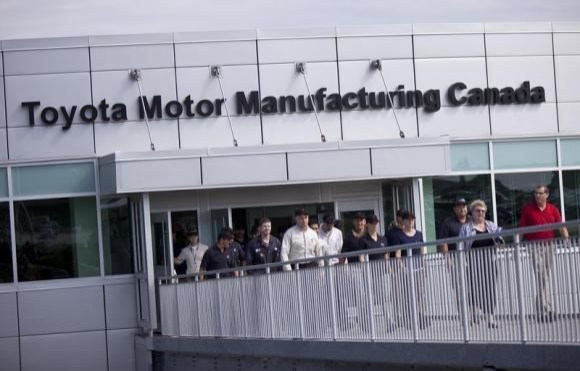Canadian Autoworkers Will Start Voting Monday To Decide If 3 Toyota Plants Will Become Union Workshops

Canadian auto workers begin voting next Monday on whether they want Unifor, the country’s largest private-sector union, to represent them in contract negotiations with Toyota Motor Manufacturing Canada Inc., the wholly owned subsidiary of the Toyota Motor Corp., the world’s largest automaker by sales volume.
If workers vote to unionize three Toyota manufacturing plants in Cambridge and Woodstock, Ontario, it would be a major success for organized labor after recent failures to turn U.S. plants operated by Nissan and Volkswagen into union shops with collective bargaining arrangements. A Unifor success north of the border would likely embolden the United Automobile Workers to push for votes south of the border. Toyota (TYO:7203) operates six plants in the U.S.
“It would absolutely carry over to people in Toyota plants in the U.S.,” Kristin Dziczek, director of industry and labor groups at the Center for Automotive Research in Ann Arbor, Mich., told International Business Times by phone on Monday. “There have been active drives at Toyota for a while. They’ve never come to a point where there’s been enough momentum to call for votes. But the UAW has been active in Toyota plants, as well as in plants owned by Honda, Nissan and VW. They’re kind of pushing on all fronts.”
Unifor says Toyota has too much unchecked power over its estimated 6,500 plant workers. The Canadian Auto Workers, which began as the UAW's affiliate, merged with another major union to become Unifor in 2013.
“The company has unilateral right to make changes as it pleases,” Jerry Dias, Unifor’s national president, told IBTimes hours after the union filed its application on Monday to the Ontario Labor Relations Board to conduct a workplace vote. “Not having an agreement in place, and Toyota’s unilateral right to decide what it wants, is a real key issue there.” Toyota Motors Manufacturing Canada and Toyota Canada Inc. did not return calls for comment.
In the U.S. there’s been a shift toward negotiating profit-sharing agreements instead of pay raises, especially in the wake of the 2009 auto industry crisis that sent Chrysler and GM into Chapter 11 reorganization.
In 2011, the UAW celebrated its collective bargaining agreement with the Detroit 3 automakers, which did not include demands for salary increases but did improve transparency in profit-sharing agreements. In January Ford Motor Co. (NYSE:F) dished out an average of $8,800 to each of its roughly 47,000 hourly workers after its reporting its strongest net profit in more than a decade. The UAW has not negotiated a base pay increase in more than eight years.
But Dziczek says she doesn’t see collective bargaining agreements that adopt profit-sharing or two-tier pay systems happening in Canada. “When they last negotiated, the CAW rejected flexible compensation, profit-sharing and second-tier, all of the things the UAW has done in the U.S. They have not been on board with those kind of agreements,” she said.
Flexible compensation is when workers are given the choice between taxable income and tax-free benefits. Second-tier refers to the two-tier system where newer employees are paid less for the same work performed by workers who have been around longer. The two-tier system is considered an alternative to using more temporary workers.
One big issue for Unifor, Dias says, is the high level of dependence on contract workers. Based on feedback from plant employees, Unifor estimates that about 25 percent are contract employees who work full time and overtime without the benefits given regular employees. Unifor says these employees can work for as long as three years under these conditions before they’re considered regular employees.
“They have no benefits, no pension plans and they can be contract employees for years,” Dias added.
Canada has five so-called international auto manufacturers, meaning companies that aren’t General Motors, Ford, or Chrysler, who operate several unionized manufacturing facilities in Ontario: the three Toyota plants, which make the Corolla subcompact, the Lexus RX mid-sized luxury crossover and the RAV4 compact crossover, and two Honda plants in Alliston, Ontario, where the Civic compact and CR-V crossover are produced.
Normal, Ill.-based Mitsubishi Motor Manufacturing of America Inc., which produces the Outlander Sport mid-sized crossover, is the only U.S.-based foreign-owned auto factory with union representation.
The most recent attempt to unionize a U.S.-based, foreign owned car factory was in February in Chattanooga, Tenn., where the UAW failed to lure enough Volkswagen workers to vote for an unconventional arrangement that would have ceded some UAW negotiating authority to a German-style works council. The vote posed an unusual situation where the Wolfsburg, Germany-based automaker (FWB:VOW) appeared to be supportive of the union effort. Nevertheless, the workers struck down the deal after intense local campaigning by anti-union groups and comments from Republican Sen. Bob Corker, a former Chattanooga mayor. The senator claimed that if the workers voted against the UAW, Volkswagen would reward them with a deal to manufacture a new mid-sized sedan, a claim Volkswagen vigorously denied. The National Labor Relations Board is reviewing the UAW’s challenge to the election results, which could lead to a new vote.
The UAW said in its annual report filed with the Department of Labor last week that its membership grew 2 percent in 2013, and it touted success in the South, which has been traditionally hostile to union activity and where many foreign automakers have set up shop in recent years.
© Copyright IBTimes 2024. All rights reserved.





















